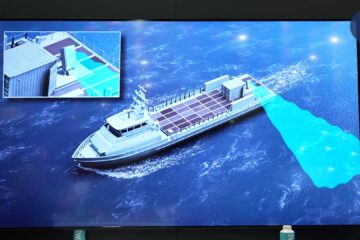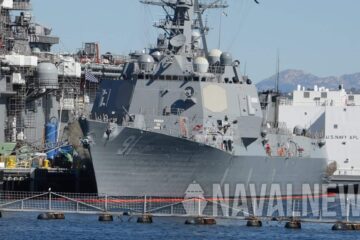By Keegan Rammel, NSWCPD Public Affairs
NSWCPD’s Machinery Control System & Advanced Damage Control System (ADCS) Branch began installing ADCS on aircraft carriers and amphibious ships on a class-by-class basis in 2018. The system helps ships manage damage control incidents on U.S. Navy and Coast Guard ships – everything from an enemy attack to an accidental collision or fire. Prior to March 2020, ADCS had been installed on nine ships across the fleet.
With the onset of COVID-19, NSWCPD proposed re-purposing ADCS to help ships manage and mitigate the impact of the virus. The software was already designed to be used in the event of a chemical or biological attack, providing capabilities for personnel tracking, plotting boundaries around quarantined areas, and managing traffic throughout the ship.
“The ability to innovate is a cornerstone of ADCS,” said John Buckley, NSWCPD Machinery Control Systems and ADCS branch manager. “One of the directives we had when we started designing the system was that it had to be adaptable for purposes we had never even considered. A global pandemic was not something we had planned on, but keeping sailors safe definitely was.”
Laptops are currently scheduled to be delivered to 171 surface ships across the fleet.
This effort represents a substantial amount of collaboration and innovation across the Naval Sea Systems Command (NAVSEA) enterprise. The engineers, software developers, and trainers of the NSWCPD 516 Damage Control Automation team worked closely with the Technical Warrant Holder for Damage Control and Personnel Safety, Hank Kuzma (SEA05P5) and his team to develop a plan to rapidly deploy the laptops across the fleet.
“We are delivering these laptops to all surface ships in the fleet in a 2-4 month timeframe from when we were originally tasked by NAVSEA 05’s Naval COVID Rapid Response Team (NCR2T),” Buckley said. “Everyone that’s been involved with this project has bent over backwards to make it happen. Everyone recognizes its importance for the safety of our Sailors.”
Acquisition of the laptops and the ability to provide them to the fleet in a short time frame was accomplished through collaboration across NSWCPD technical and support codes.
“Division, branch, program, financial managers and IT managers in the Contracts department, Corporate Operations department, Machinery Programs and Platforms department, and Machinery Research, Logistics and Ship Integrity department immediately pitched in, making it possible to procure over 150 laptops in an extremely compressed schedule,” Buckley said. “The Public Affairs Office stepped in to make a ’How-To’ video to familiarize Sailors who have never seen ADCS before on the operation of the system. Integrated Logistic Support (ILS) personnel provided immediate response to requests for development of support documentation for the effort. The Chief Engineer’s Office and Systems Engineering Process group were also extremely supportive.”
NAVSEA Naval Systems Engineering Technology Office and the Naval COVID Rapid Response Team, who is leading NAVSEA’s efforts to sanitize and continue operation of the fleet, championed and funded the project.
“NSWCPD’s damage control team has done an incredible job to meet the mission and provide this technology to the fleet to protect the health of our Sailors,” said Capt. Dana Simon, NSWCPD’s Commanding Officer.
When Buckley first saw the news of the COVID-19 outbreak that occurred on USS Theodore Roosevelt (CVN 71), he knew that they would need help tracking all 3,000 spaces onboard. NSWCPD’s Damage Control Team immediately started working on how to best use the ADCS to help the crew establish quarantine spaces, track where infected Sailors had been, and schedule regular cleaning to help mitigate the virus.

During a ship visit with USS Tortuga (LSD-46) following the install of the ADCS, the ship’s Medical Officer asked Buckley if ADCS could be utilized to track COVID-19. After speaking with the Commanding Officer, Cmdr. Rosie Goscinski, it was clear that the crew needed to be able to track the shipyard workers who were coming aboard, if they had any symptoms, which spaces they were working in, and with whom they came into contact. USS Tortuga is the first surface ship in the Atlantic Fleet to receive ADCS, and they have been strong advocates of the benefits of the system.
“We installed a laptop on the quarterdeck to begin tracking who came on and off the ship,” Buckley said. “DDG 84 (USS Bulkeley) was in the same shipyard and unfortunately a shipyard worker who had died from COVID had been onboard, so we were sure to get them an early version.”
Early in the process, the Atlantic Fleet began assessing the validity of ADCS to be used to mitigate COVID-19 cases. Commander Naval Surface Force Atlantic and Force Surgeon, CAPT Rees Lee, MD, recommended ADCS to manage and track cases.
“There is great potential for the system to be used effectively beyond just damage control management,” Capt. Lee said “ADCS has the ability to be an effective patient tracking system.”
Early feedback from the fleet has been positive. As crews are becoming more comfortable with the software they are finding unique ways to apply it to best suit their needs. Crews are using ADCS’ egress and passage system to help further social distancing by providing traffic control by directing the crew down certain passageways to prevent individuals from crossing paths in close quarters. Crews can also track disinfection and cleaning schedules.
USS Bulkeley’s Commanding Officer Cmdr. Luis Angel Gonzalez told Buckley that ADCS, “Has been a game changer onboard. While we are still learning how to fully maximize all the system offers, it certainly has made the ability to conduct contact tracing infinitely more effective and easier.”
NSWCPD personnel have been working closely with crews to apply all lessons learned to the second phase of 95 additional laptops, which began delivery on Aug. 14, and to the original 10, including ease of use upgrades.
The delivery of the final 66 laptops is currently scheduled to be completed by the end of September, with the potential to expand the program to other ship classes and to the U.S. Coast Guard.
“Of course this task would not have been possible without the efforts of the damage control team – they have put in extremely late nights and weekends to meet this very challenging schedule,” Buckley said.
NSWCPD’s ADCS project manager Mike Kaminski developed a training video to help walk Sailors through how to use the software including tracking personnel and plotting data. The How-To video is accompanied by a technical manual and other documentation installed on the laptop.
“ADCS operation was developed to be intuitive from the start, but it was important to provide, along with the user documentation, an instructional video to step the user through the guidance provided for COVID response to get them running right away,” Kaminski said.
NSWCPD employs approximately 2,700 civilian engineers, scientists, technicians, and support personnel doing research and development, test and evaluation, acquisition support, and in-service logistics engineering for Navy ships. NSWCPD is also the lead organization providing cybersecurity for all ship systems.






